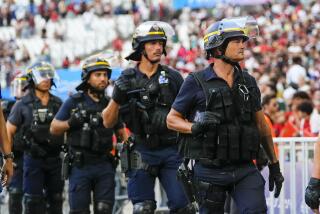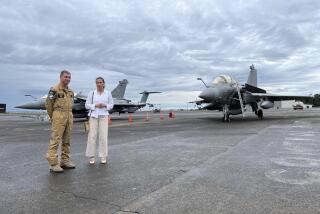After French terror attacks, prime minister calls for crackdown
French leaders launched a multi-pronged anti-terrorism campaign Tuesday, with the prime minister making an impassioned plea for a crackdown on Muslim extremists and lawmakers voting to renew participation in U.S.-led airstrikes against Islamic State militants in Iraq.
“An exceptional situation must be met with exceptional measures,” said Prime Minister Manuel Valls, promising these measures would not “detract from the principles of rights and values.”
France’s lower house of Parliament approved extending the airstrikes, in a clear rebuttal to the string of terrorist attacks that began Jan. 7 and left 17 people dead in and around Paris, in addition to the three perpetrators who were killed by security forces.
Before the vote, Valls delivered his rousing speech calling for increased measures to fight terrorism and boost intelligence-gathering within France, although it was unclear how extreme the crackdown will be. France has prided itself on protecting civil liberties and avoiding some of the sweeping provisions enacted in the United States after the Sept. 11 attacks, such as the extensive surveillance measures undertaken by the National Security Agency.
Valls called for new surveillance and isolation of Muslim extremists in prisons by year’s end to prevent leaders from proselytizing.
“Radicalization develops in prison; this is nothing new,” he said.
Two of last week’s attackers — Cherif Kouachi and Amedy Coulibaly, both 32 — reportedly came under the influence of a French-Algerian militant convicted in a 2001 plot to bomb the U.S. Embassy in Paris when they were being held at Fleury-Merogis Prison, the largest in Europe, with a population of about 3,800.
Prison officials have been testing a proposed system of segregating Muslim radicals from the general population since October at Fresnes Prison south of Paris, the second-largest in the country.
But the interior minister has yet to expand it and has said she has reservations.
On Tuesday, Valls also called for creating a special listing of those convicted of terrorist acts or belonging to extremist groups, and reinforcing the Interior Ministry’s anti-terrorism efforts. He asked the minister to create a security proposal in the next eight days that includes ways to monitor terrorists’ use of the Internet and social media, which he said “are used more than ever for indoctrination, making contact and bringing about the act.”
It was unclear Tuesday whether the stepped-up security Valls was advocating would include Patriot Act-style provisions that civil rights advocates have complained infringe on suspects’ rights.
Valls promised to preserve the rule of law and cautioned that increased security should not violate the rights of citizens, including Muslims. “France is at war against terrorism, jihadism and radical Islamism,” he said. “France is not at war with Islam and Muslims.... France will protect all its citizens with determination and composure.”
The prime minister reported that the high-powered weapons used in the slayings last week, including Kalashnikov assault rifles, had been brought from abroad, although he did not say where they came from or who bought them.
Authorities were working to trace the source of the weapons funding.
Police were still searching Tuesday for Coulibaly’s girlfriend, Hayat Boumeddiene, 26, who could be seen in new surveillance video clearing customs in Turkey and later traveled to Syria, officials said.
Officials also revealed this week that a man believed to be related to the Kouachi brothers was taken into custody in Bulgaria on New Year’s Day as he attempted to cross into Turkey. On Monday, European authorities issued an arrest warrant for Fritz Jolie Joaquin, 28, that accused him of “participating in a criminal group whose objective was to organize terrorist acts,” the newspaper Le Figaro reported.
Jean-Charles Brisard, chairman of the Paris-based Center for the Analysis of Terrorism, said that the Paris assailants appeared to have been inspired primarily by one another and that it was too early to know whether they were acting at the direction of groups such as Al Qaeda or Islamic State.
“Their friendship ties were stronger than their affiliation to this organization or another. They knew each other for more than 10 years; they decided to act together, in a coordinated way. That is the most important,” he said. “The investigation will reveal the links that they had with organizations and whether they were inspired or directed, incited by a group to act.”
He said the type of weapon used in the attacks is routinely smuggled into France through the Balkans and Libya. He disputed police assertions that size of the attackers’ stockpile suggested they had financial backing. He said the collection was worth about $30,000 at most.
“For that, you don’t need external funding the way we have seen in the past with Al Qaeda,” Brisard said.
He noted reports Tuesday that before the attack, Coulibaly had taken out a loan from a credit bureau called Cofidis, which he could have used to buy his guns and other weapons.
La Voix du Nord, a regional newspaper, reported that the Dec. 4 loan was for about $7,000. To obtain the loan, Coulibaly provided a copy of his identification card, telephone bill and pay stub showing that he had received about $3,500 from a Paris business in November.
The attacks continued to send ripples internationally. Lawyers for the Boston Marathon bombing suspect, Dzhokhar Tsarnaev, asked a judge to suspend jury selection in his trial for at least a month because potential jurors could be affected by the “grim global drama.”
Also Tuesday, French President Francois Hollande led tributes to the three police officers killed in the attacks. In Israel, officials mourned four Jewish victims of the siege at a Paris kosher supermarket.
Hollande awarded the slain officers Legion of Honor medals.
“I assure you that the whole of France shares your sadness and your pain,” he told their families. “Three police officers died so that we can live free.”
On Wednesday, a week after the attack at Charlie Hebdo magazine, the staff plans to publish its next edition. Gerard Biard, the editor in chief, said 3 million copies will go on sale in multiple languages, in contrast to the usual run of 60,000.
The cover, which has already stirred controversy in the Middle East, shows a sad-faced prophet Muhammad holding a sign that says, “Je Suis Charlie” — I am Charlie — under the headline “All Is Forgiven.”
Hennessy-Fiske reported from Paris and Zavis from Los Angeles. Special correspondent Christina Boyle in London and Batsheva Sobelman in The Times’ Jerusalem bureau contributed to this report.
More to Read
Sign up for Essential California
The most important California stories and recommendations in your inbox every morning.
You may occasionally receive promotional content from the Los Angeles Times.












